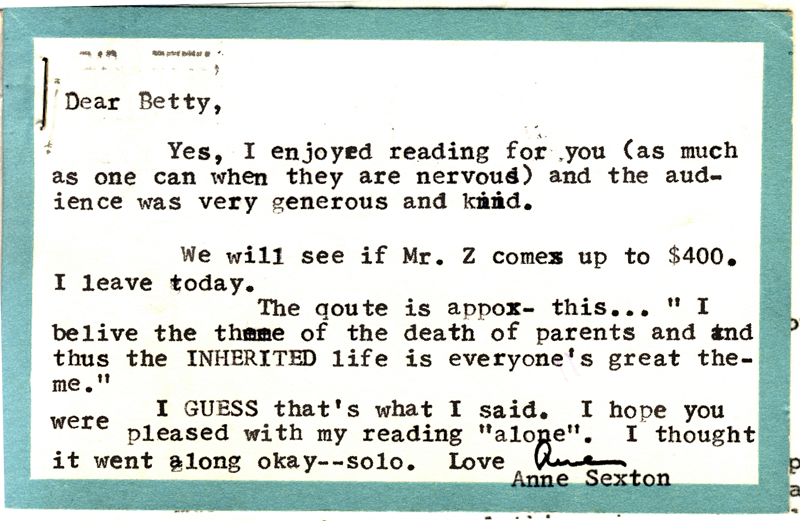
In this 1967 postcard from our archive, Anne Sexton replies to Betty Kray, the first executive director of the Academy of American Poets, regarding a recent reading she had done for the organization.
This postcard was written just months after Sexton received the Pulitzer Prize for her third collection, Live or Die (Houghton Mifflin, 1966). This marked the peak of her career, with she herself reaching a sort of celebrity status; she received significant honors and fan letters and embarked on a reading tour. Despite this marked success and the confidence it inspired in her, she still maintained a level of discomfort with doing public performances—something apparent in her insecure and modest account of the reading in the postcard.
Here Sexton also recalls for Kray something she presumably said during the reading: “I believe the theme of the death of parents and thus the inherited life is everyone’s great theme.” This quote certainly rang true for Sexton, who had a complicated relationship with her own parents.
Sexton biographer Diane Wood Middlebrook described Sexton’s parents, Mary Gray Staples and Ralph Churchill Harvey, as “out of a Scott Fitzgerald novel.” Indeed, they lived within the extravagant dream of the 1920s, which included plenty of parties and drinking. Harvey, who had an especially troubled relationship with Sexton, was an alcoholic businessman in the wool industry who traveled frequently. He and his wife were unpredictable at times, and their relationship with Sexton was possibly abusive—though accounts of this, even Sexton’s own, varied.
Though Sexton described her family as “hostile,” she was still greatly affected by the death of her parents in 1959. Her feelings of loss and grief figured strongly in her second collection, All My Pretty Ones (Houghton Mifflin, 1962), and her family would continue to appear in her later work.
When Sexton mentions “the inherited life,” perhaps she is referring to the demons she faced in her life, which weren’t unlike those her family members faced as well. Portents of her fate could be read in their stories: Her great aunt and grandfather were hospitalized for psychiatric illness, her father was an alcoholic, and her aunt and sister committed suicide.
Despite the morbid end that lay before her, here Sexton begins a period of readings, awards, and relative stability in which audiences continue to be “generous and kind” and beyond: Sexton’s fame would continue beyond this moment and even beyond her death, as she remains an important figure in American poetry today.
